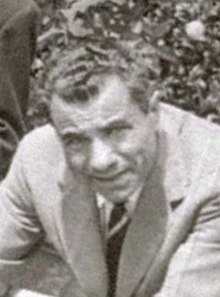Salvatore Ferragamo (5 June 1898 – 7 August 1960) was an Italian shoe designer and the founder of luxury goods high-end retailer Salvatore Ferragamo S.p.A. An innovative shoe designer, Salvatore Ferragamo established a reputation in the 1930s. In addition to experimenting with alternative materials such as fish skin, Ferragamo drew on historic inspiration for his shoes.
Salvatore Ferragamo | |
|---|---|
 Ferragamo, c. 1959 | |
| Born | 5 June 1898 |
| Died | 7 August 1960 (aged 62) Florence, Italy |
| Alma mater | University of Southern California |
| Occupation | Shoe designer |
| Known for | Founder of Salvatore Ferragamo S.p.A. |
| Notable work | Cage heel, wedge heel |
| Spouse | Wanda Ferragamo |
| Children | 6 |
Early life
editSalvatore (registered as "Salvadore") Ferragamo was born in 1898[1] to a poor family in Bonito, in the Campania region of Italy, near Avellino, the eleventh of fourteen children of Antonio Ferragamo and Mariantonia Ferragamo (both had the same surname, which often happened in smaller Italian towns). After making his first pair of shoes for himself, a pair of high heels, at age nine (and his sisters to wear at their confirmation), young Salvatore decided that he had found his calling.[citation needed]
Career
editAfter studying shoemaking in Naples for a year, fourteen year old Ferragamo opened a small store based in his parents' home. In 1915, he emigrated to Boston, Massachusetts, where one of his brothers worked in a cowboy boot factory. After a brief stint at the factory, Ferragamo convinced his brothers to move to California, first Santa Barbara then Hollywood. It was there that Ferragamo found success, initially opening a shop for repair and made-to-measure shoes, leading to a long period of designing footwear for the cinema.
Reluctant to accept that his shoes could be beautiful but uncomfortable to wear, he studied anatomy at the University of Southern California.[citation needed]
After spending thirteen years in the US, Ferragamo, now thirty-three returned to Italy in 1927, settling in Florence. He began to fashion shoes for prominent women, including the Maharani of Cooch Behar, Eva Perón and Marilyn Monroe. He opened a workshop in the Via Mannelli, experimenting with design, while applying for patents for his innovations. He filed for bankruptcy in 1933 due to bad management and economic pressure, but was able to expand his operations in the 1950s, including a workforce of 700 artisans who made 350 pairs of shoes per day, by hand.[citation needed]
"The Rainbow" was created by Salvatore Ferragamo in 1938 and was the first instance of the platform shoe returning in modern days in the West. The platform sandal was designed for American singer and actress Judy Garland. The shoe was a tribute to Garland's signature song "Over the Rainbow" performed in The Wizard of Oz (1939) feature film. The shoe was crafted using shaped slabs of cork covered in suede with gold kidskin straps. He was inspired to experiment with new materials to find those not rationed during World War II.[2]
Death and legacy
editSalvatore Ferragamo died in 1960 at the age of 62, but his name lives on as an international company, which has expanded its operations to include luxury shoes, bags, eyewear, silk accessories, watches, perfumes and a ready-to-wear clothing line. At his death, his wife Wanda and later their six children (Fiamma, Giovanna, Fulvia, Ferruccio, Massimo and Leonardo) ran the company. [citation needed]
His most famous invention is arguably the "Cage heel".[citation needed] Fiamma (Salvatore's eldest daughter who died in 1998) came up with the "Vara pumps" in 1978.[citation needed]
A museum dedicated to Ferragamo's life and work opened in the Palazzo Spini Feroni in 1995.[3] The palazzo had been bought by Ferragamo in the 1930s.[citation needed]
In March 2013, Ferragamo's fashion house, Salvatore Ferragamo S.p.A., established the Ferragamo Foundation in Florence. The foundation was formed to cultivate young fashion designers, based on the ideas of Salvatore Ferragamo.[4]
Present day
editThe company is owned by the Ferragamo family, which in November 2006 included Salvatore's widow Wanda, five children, 23 grandchildren and other relatives. There is a rule that only three members of the family can work at the company, prompting fierce competition.[citation needed]
Family
edit- Wanda Ferragamo Miletti led the group since 1960, when her husband and founder of the company, Salvatore, died. She was honorary chairman until her death in 2018.[5]
- Ferruccio Ferragamo, chairman of the company
- Giovanna Gentile-Ferragamo, vice president of Salvatore Ferragamo SpA
- Leonardo Ferragamo, since 2000, has been the Director of Salvatore Ferragamo SpA, Ferragamo Finanziaria; Executive Vice President of the Fondazione Ferragamo and owner of Finnish luxury yacht builder OY Nautor Swan.[6]
- Massimo Ferragamo, Chairman of Ferragamo USA.
- Fulvia Visconti-Ferragamo, who died in March 2018, ran the fashion label's silk accessories division beginning in the 1970s. She was the Deputy Chairwoman of Ferragamo Finanziaria SpA.
- Fiamma Ferragamo di San Giuliano, who died in 1998, was involved in the creation of some of the brand's products, such as Vara shoe and the Gancino.
- James Ferragamo, Women's and Men's Shoes and Leather Goods Division Director for the Salvatore Ferragamo Group
- Angelica Visconti Ruspoli, South Europe Director
- Diego Paternò di San Giuliano coordinates the digital activities of the brand.
References
edit- ^ "Portale Antenati".
- ^ DeMello, M. (2009). Feet and footwear: A cultural encyclopedia. Santa Barbara, California: Greenwood Press/ABC-CLIO.
- ^ "Ferragamo's return to Italy... 90 years later | Florence Daily News". Florence Daily News. 28 April 2017. Retrieved 23 November 2017.
- ^ Kilcooley-O'Halloran, Scarlett (27 March 2013). "Salvatore Ferragamo Launches Fashion Foundation". Vogue.
- ^ Syme, Rachel (24 October 2018). "Wanda Ferragamo, 96, Dies; Reigned Over Family's Luxury Goods Empire". The New York Times. Retrieved 15 January 2019.
- ^ "Leonardo Ferragamo: The fashion magnate behind Nautor's Swan's remarkable rise". 13 August 2020. Retrieved 2 April 2023.
Further reading
edit- Ricci, Stefania; Glanz Margo; Mercedes Iturbe (2006). Walking Dreams: Salvatore Ferragamo, 1898-1960.